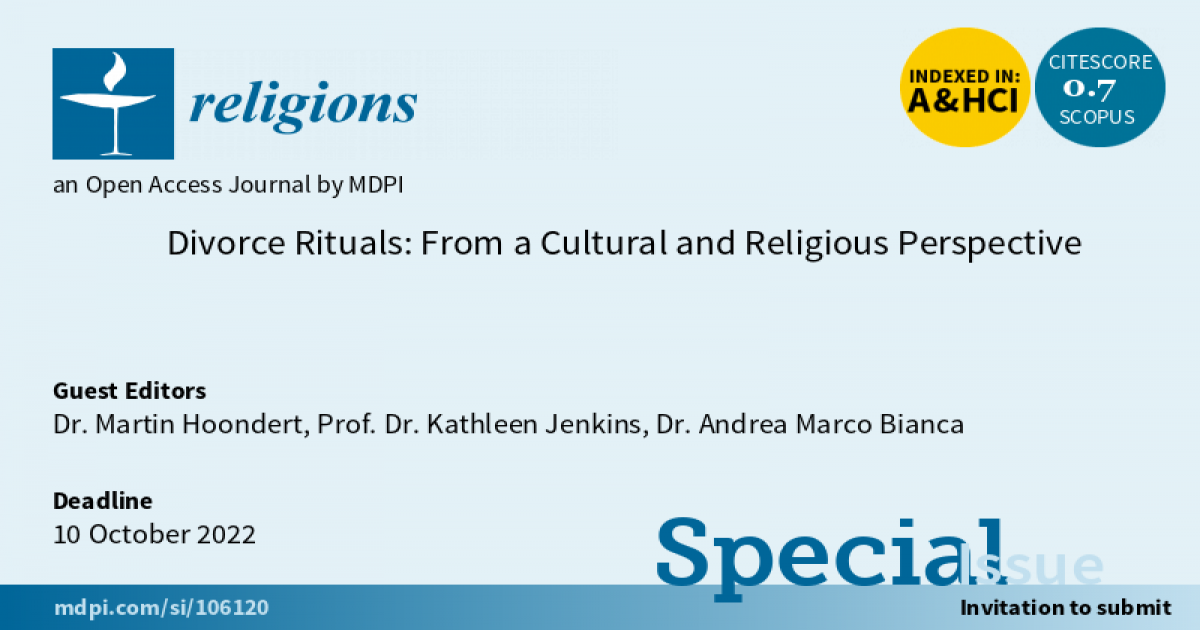Divorce Rituals: From a Cultural and Religious Perspective
A special issue of Religions (ISSN 2077-1444). This special issue belongs to the section "Religions and Health/Psychology/Social Sciences".
Deadline for manuscript submissions: closed (5 January 2023) | Viewed by 8439

Special Issue Editors
Interests: ritual; music; death; funeral; cremation; memory culture; genocide
Special Issues, Collections and Topics in MDPI journals
Interests: religion and family; therapeutic culture; sociology of pilgrimage; New Religious Movements
Special Issue Information
Dear Colleagues,
The aim of this Special Issue is to collect descriptions, analyses and evaluations of divorce and end-of-relation rituals from various cultures and religions. In many cultures, the beginning of a relationship is celebrated with family and friends. Relations can be ritualized in both a secular and religious way, and in some countries, churches have an official role in registering relationships (e.g., Finland and Denmark). In ritual studies, marriage or other forms of registering and ritualizing the beginning of a relationship are considered transformative rituals (Grimes 2000). However, what happens when partners decide to part, and a relationship is brought to an end? Do people ritualize the ending of their relation to mark, once again, the transformation from being partners to being separated? There are many practical guides helping partners to work through the process of divorce, with Constance Ahrons’ The good divorce (1994) as a ground-breaking example of this genre. The academic literature regarding divorce or end-of-relation rituals, however, is scarce. Although the literature regarding divorce from sociological and psychological perspectives is overwhelming, with Emery’s Cultural Sociology of Divorce: An Encyclopedia (2013) as one of the main sources, alongside the scholarly Journal of Divorce and Remarriage (since 1977) and the more popular Divorce Magazine (USA and Canada, since 1996), there is hardly any attention paid to the divorce ritual in the academic literature, with Bianca’s dissertation (2015) being an exception. The purpose of this Special Issue of Religions is to bring together research regarding secular and religious divorce and end-of-relation rituals. We hope to engage scholars with expertise in various cultures and religions and to offer a selection of articles that is culturally and religiously diverse. The guiding questions are:
- In what ways and by what means do churches and secular institutions facilitate divorce and end-of-relation rituals? What are good examples of useful (healing, transformative) divorce rituals?
- What is the doctrinal position of churches/religious institutions/religions regarding divorce?
- What is the relevance of divorce and end-of-relation rituals for the people involved, from sociological and psychological perspectives? How do these rituals help people to cope with divorce and to re-organize their lives?
We invite scholars to submit articles in which they reflect on either the usefulness and functions, or the reasons and consequences of the absence of divorce and end-of relation rituals.
We request that, prior to submitting a manuscript, interested authors initially submit a proposed title and an abstract of 400-600 words summarizing their intended contribution. Please send it to the guest editors (m.j.m.hoondert@tilburguniversity.edu) or to the Religions editorial office (religions@mdpi.com). Abstracts will be reviewed by the guest editors for the purposes of ensuring proper fit within the scope of the Special Issue. Full manuscripts will undergo double-blind peer-review.
Tentative completion schedule:
- Abstract submission deadline: 15 April 2022
- Notification of abstract acceptance: before 1 May 2022
- Full manuscript deadline: 9 January 2023
- Publication of the special issue: Spring 2023
References
Ahrons, Constance R. 1994. The good divorce: keeping your family together when your marriage comes apart (HarperCollins: New York).
Bianca, Andrea Marco. 2015. Scheidungsrituale. Globale Bestandsaufnahme und Perspektiven für eine glaubwürdige Praxis in Kirche und Gesellschaft (Theologischer Verlag Zürich: Zürich).
Emery, Robert E. 2013. Cultural sociology of divorce: an encyclopedia (SAGE Reference: Thousand Oaks, Calif.).
Grimes, Ronald. 2000. Deeply into the bone: re-inventing rites of passage (University of California Press: Berkeley, Calif.).
Hoondert, Martin. (2019). Emerging Ritual: Divorce Ritual, in Paul Post & Martin Hoondert (eds). Absent Ritual. Exploring the ambivalence and dynamics of ritual (Durham, N.C.: Carolina Academic Press) 31-44.
Jenkins, Kathleen E. 2014. Sacred Divorce: Religion, Therapeutic Culture, and Ending Life Partnerships (New Brunswick: Rutgers University Press).
Dr. Martin Hoondert
Prof. Dr. Kathleen Jenkins
Dr. Andrea Marco Bianca
Guest Editors
Manuscript Submission Information
Manuscripts should be submitted online at www.mdpi.com by registering and logging in to this website. Once you are registered, click here to go to the submission form. Manuscripts can be submitted until the deadline. All submissions that pass pre-check are peer-reviewed. Accepted papers will be published continuously in the journal (as soon as accepted) and will be listed together on the special issue website. Research articles, review articles as well as short communications are invited. For planned papers, a title and short abstract (about 100 words) can be sent to the Editorial Office for announcement on this website.
Submitted manuscripts should not have been published previously, nor be under consideration for publication elsewhere (except conference proceedings papers). All manuscripts are thoroughly refereed through a double-blind peer-review process. A guide for authors and other relevant information for submission of manuscripts is available on the Instructions for Authors page. Religions is an international peer-reviewed open access monthly journal published by MDPI.
Please visit the Instructions for Authors page before submitting a manuscript. The Article Processing Charge (APC) for publication in this open access journal is 1800 CHF (Swiss Francs). Submitted papers should be well formatted and use good English. Authors may use MDPI's English editing service prior to publication or during author revisions.
Keywords
- divorce
- ritual
- religion
- secular institutions
- transformation







